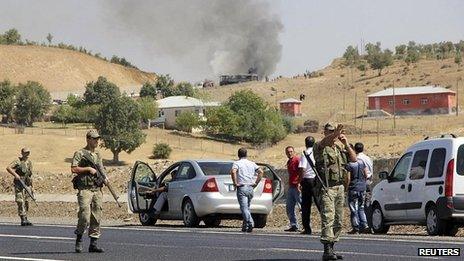Turkey's war with PKK reaches new peak
- Published

Turkey's conflict with the Kurdistan Workers' Party (PKK) has escalated rapidly in the past few months, with some of the heaviest fighting in three decades.
It is a remarkable deterioration from a point where unprecedented talks were proceeding less than two years ago.
In a recently published report, the think-tank International Crisis Group said more than 700 people had died in the past 14 months, the highest casualty rate in 13 years.
In the past few days the PKK has launched two separate attacks in the eastern province of Bingol, killing at least 17 members of the Turkish armed forces and wounding more than 70.
Meanwhile the Turkish army says it has staged close to 1,000 counter-insurgency sorties in the past six months.
Syrian link?
Successive Turkish governments have always pointed the finger at "foreign forces" for igniting the Kurdish problem in Turkey.
The US and the EU, despite their classification of the PKK as a terrorist organisation, have occasionally been blamed for actively or passively supporting the organisation, while Israel also gets a share of the blame.
Currently, officials say the conflict in Syria is behind the surge in PKK attacks.
President Abdullah Gul suggested that the Syrian regime might have renewed its co-operation with the PKK after years of hostility.
It has provoked fears in Turkey of Syrian Kurds being allowed to establish an autonomous region across the Syrian border.
However, both the PKK and the Syrian government deny co-operating.
And many analysts believe the PKK is simply taking advantage of Syria's focus on its own insurgency.
Prof Mesut Yegen of Sehir University in Istanbul, says: "It is possible that the organisation may have found a window of opportunity, at a certain point during the Syrian conflict, to gain ground in Syria and escalate its fight against Turkey."
And Kurdish militants see threats, as well as opportunities, from the Syrian conflict.
Their gains in Syria are far from stabilised, and they fear the crisis in Damascus may tempt Turkey to intervene.
The PKK's executive leader, Murat Karayilan, warned that if Turkey were to step in to "western Kurdistan" (Kurdish areas of Syria) then "the entire Kurdish people will struggle against Turkey".
Peace derailed
However, the recent upsurge in unrest is perhaps better explained by the internal dynamics of the conflict.
It is less than two years since the Turkish government was pushing its "Kurdish Opening". As well as high-level talks with the PKK, it included Kurdish-language education, restoring Kurdish place names and more freedom to use Kurdish in election campaigns.
A PKK ceasefire was in place and there were high hopes for an end to the three-decade Kurdish conflict.
However, the whole process has been derailed. Some analysts say the turning point was when some PKK fighters, who crossed over from Iraq and announced they wanted to lay down their arms, were given a heroes' welcome by Kurds, provoking a nationalist backlash.
Relations have slid rapidly downhill ever since.
According to the International Crisis Group, thousands of non-violent activists, lawyers and journalists have been arrested under anti-terror laws.
Equally - or, perhaps, more importantly for the PKK - the government has restricted lawyers' access to the jailed leader of the PKK, Abdullah Ocalan.
The group has escalated its attacks and took its campaign to a whole new level on 23 July, with its attack and subsequent holding of territory in the town of Semdinli, in the south-eastern corner of Turkey.
Push for victory
The Turkish government seems convinced that it has the military capability and popular support needed to defeat the PKK.
But the rebels are difficult to track down, moving in small units before regrouping for larger attacks.
Turkey has drones - one of the most advanced weapons of modern warfare. But Nato has drones in Afghanistan, and they have not won it the war.
Gareth Jenkins, an Istanbul-based British expert on Turkish affairs, points out that Turkey "can have fewer than 10 drones in the air at any one time to cover a vast and extremely difficult terrain.
"And even for them to be effective the Turkish army has to have the ability to deploy a very high number of helicopters."
The PKK seems to have grown in confidence, following the Turkish army's incursion into northern Iraq in February 2008.
The army failed to destroy the main PKK camps in the region. Large-scale attacks on Turkish military posts followed.
'Only way out'
Moreover, the PKK last year announced a shift in its strategy, from trying to solve the conflict through negotiations with the government, towards establishing a dual power structure in the Kurdish-populated region.
Prof Yegen is sceptical that that can work.
"The group's only way out seems to be to force the government to start talking to them again," he says.
It might be very difficult for the government to take steps towards a dialogue at a time of such high casualty figures.
However, with the winter looming, the rebels will have to reduce their attacks, which may give the Turkish government room for manoeuvre.
"My fear is, this winter is really the last chance that Turkey may have to resolve this question before the fighting gets more widespread," Mr Jenkins says.
According to Mesut Yegen, starting talks with Abdullah Ocalan "may prove to be the magical ingredient that could bring an end to the surge in violence".
- Published22 August 2023